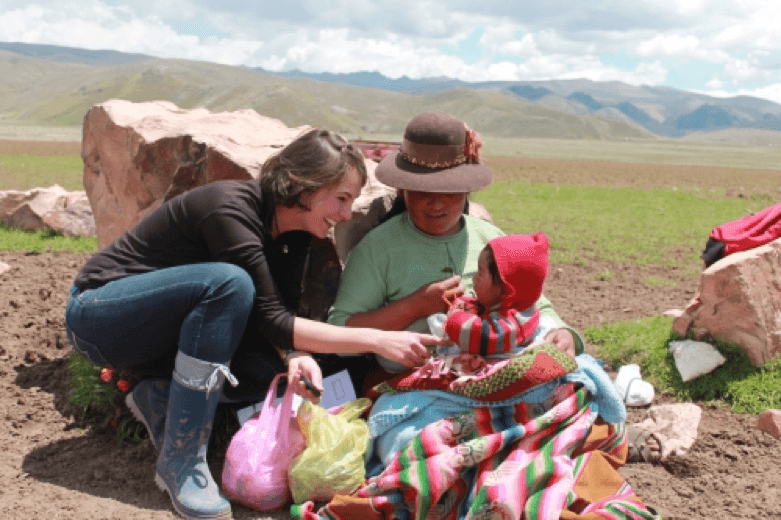Nuñoa Anthropological Project
The Nuñoa Anthropological Project encompasses several research endeavors to investigate health and disease in the rural district of Nuñoa, Peru. Located in the southern Andes, the population of Nuñoa has experienced relatively rapid but uneven integration into the regional and national economy over the past fifty years, and thus is an ideal site to study economic and nutritional transitions. The research endeavors of the Nuñoa Anthropological Project seek to characterize intergenerational transmission of health and social disparities, investigate minimally invasive, field-friendly methods of collecting health and biomarker data, and examine the interactions between political, economic, ecological, and social factors and their effects on human health.
Nutrition, Intestinal Permeability & Human Gut Microbiome in a Transitioning Population
This project explores the relationship between diet and gut health to investigate the impacts of economic and nutritional transitions on human health. The transition to high fat, calorically dense, yet nutrient poor diets following a community’s integration to globalized food production are followed by shifts in patterns of chronic diseases including obesity, metabolic syndrome, and cardiovascular disease. The study team seeks to investigate intestinal permeability and altered microbiome composition as potential mechanisms through which dietary changes result in these shifting chronic disease patterns. Additionally, this project considers the role of development and early childhood exposures in the emergence of chronic disease, by investigating relationships between diet, household characteristics, anthropometrics, biomarkers, intestinal permeability, and microbiome composition in mothers and infants. Primary data collection at the field site of Nunoa took place in the summer of 2018, with data analysis and site follow-up ongoing.
CO-PIs: Morgan Hoke & Katherine Amato (Northwestern University)
Collaborators: Amato Laboratory, Department of Anthropology, Northwestern University; Bernstein Laboratory, Department of Anthropology, University of Colorado Boulder; Biomarker Laboratory at Washington University in St. Louis, Department of Anthropology.
Summer 2018 Field Team: Clare Super, Fiona Jensen-Hitch, Lauren Schafrank, Meg Super, Nora Hennessey, Payton Puerzer
Changing Economic Activity, Infant Feeding, and Early Growth Among the Quechua of Nuñoa, Peru
A study of ethnographic human biology, this biocultural project investigates the changing practices of infant feeding and the emergence of early growth inequalities in Nuñoa. Data collection including participant observation, interviews, infant nutritional assessment, anthropometric measurements, and infant fecal follows are used to compare infant nutrition and growth between contemporary communities involved in different economic activities. Specifically, data collection is focused on the transition of infants from exclusive breastfeeding to weaning and supplementary food sources in communities of varying economic profiles (primarily dairy practices, herding practices, and urban living). In concert with research dating back to the 1960s, dietary changes and changes in the growth process in Nuñoa’s population can be placed into context of more than fifty years of economic transition. Data collection took place in the summers of 2014 and 2015.
PI: Morgan Hoke
Changing Climates, Resource Security, and Population Health: Vulnerabilities and Adaptation Strategies in Nuñoa, Peru
This project seeks to understand how changes in climate are disrupting traditional adaptation strategies, water and food security, and population health in Nuñoa, with the goal of fortifying vulnerable communities. Through systematic study and storytelling, the investigators seek to document vulnerabilities and emerging strategies that are effective in increasing the resilience of communities in the face of climate change. One aspect of the project will identify differences in water quantity and quality in upstream/high elevation vs downstream/low elevation communities, and note any differences in child growth and disease distributions. Another arm of the project will document local narratives of how climate change is disrupting traditional strategies and spawning new coping strategies through interviews with Quechua herders in the Andes, who will also collect their own photo evidence. Finally, this project will evaluate the only known small-scale water harvesting project in the district and will used mixed methodology to assess the reservoir, and local experiences and attitudes regarding the availability of water resources. Data collection is planned for 2020-2021.
PI: Morgan Hoke
Collaborators: Dr. Meagan Mazzarino. Mr. Alexis Arias Perez, Nuñoa Health Center. Mr. Uriel Alex Montúfar Condorena, Universidad Nacional del Altiplano: Puno, Peru.
Macaque Stress Project
The Macaque Stress Project aims to elucidate systemic stress responses in Rhesus Macaques (Macaca mulatta) using inflammatory biomarkers, specifically C-Reactive Protein. The project examines a population of Rhesus Macaques in Puerto Rico, before and after Hurricane Maria, to better understand how stressful events can induce behavioural and physiological changes that manifest measurable biomarkers. Additionally, the team is interested in analysing Macaque social networks to examine the role of protective social clustering in the face of stressful events. Beyond BAMLab itself, the team also collaborates with other research groups within the University of Pennsylvania, specifically with the Seale Lab and Platt Lab, both based in the Perelman School of Medicine.
Project Team: Jordan Liu, Sam Larson, Anne Lally
Collaborators: The Platt Lab at Perelman School of Medicine, Dept. of Neuroscience. The Seale Lab at Perelman School of Medicine, Institute of Diabetes, Obesity, and Metabolism
BAMLab News
Keep up to date on the latest news from our members!
Learn More
Questions for us or interested in joining?



